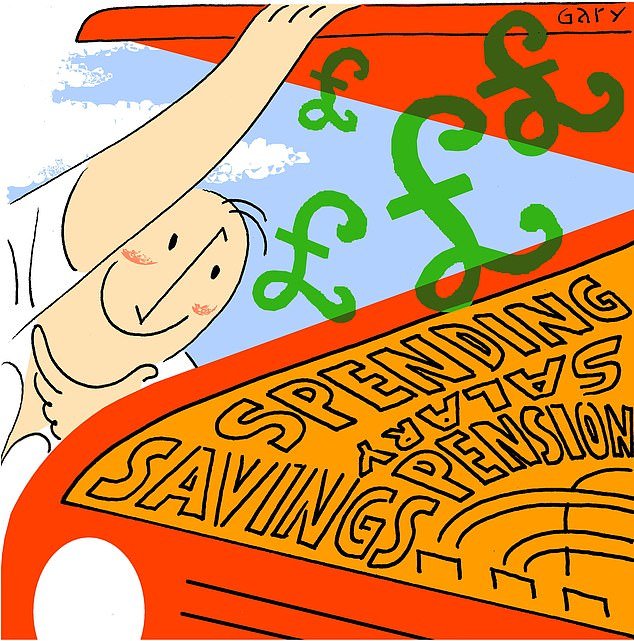More middle-aged savers should take a financial health check to get them ready for retirement, the pensions minister has told MPs.
It is hoped that a simple ‘midlife MOT’ will give those aged between 45 and 60 a good idea of how prepared they are for later life, and help them take action now to fix any shortfalls.
Experts have long feared the nation is not saving enough for retirement against a backdrop of increasing life expectancy, rising state pension age and the demise of generous final-salary pensions.
It is hoped that a simple ‘midlife MOT’ will give those aged between 45 and 60 a good idea of how prepared they are for later life, and help them take action now to fix any shortfalls
A major report in January warned that nearly six years on from the pension freedoms, millions of us are sleepwalking into retirement with no clear idea of how much income we will have.
Minister Guy Opperman told the Work and Pensions Committee in February that he was a ‘massive fan’ of the midlife MOT developed by some private pension providers.
He said the test educated savers and gave them the chance to ‘address the problems coming down the track’.
He says: ‘It’s not just about retirement savings but also about enabling people to enjoy a fuller working life by helping them understand the skills they will need to learn along the way.’
The Government-backed Money And Pensions Service is to start developing its own ‘later-life checklist’ this year.
And there will be a £400,000 funding boost for schemes that help people take stock of their health, skills and wealth as part of later-life planning for the future.
Insurer Aviva has already launched a 30-question midlife MOT, which rates your attitude to wealth, work and wellbeing – giving you a score out of 100.
Alistair McQueen, head of savings and retirement at Aviva, says: ‘Two hours dedicated to a mid-life MOT could be one of the best investments we make all year.’
Here, Money Mail has produced a version of Aviva’s test to give you an idea of how your retirement might be shaping up.
The quiz also tests your wellbeing. The healthier you are, the longer your pension will need to last.
For each question, score your answer in the following way and add all your points up: strongly agree (5 points); agree (4); neither agree nor disagree (3); disagree (2); strongly disagree (1); or not relevant (3).

Experts fear Britain is not saving enough for retirement against a backdrop of increasing life expectancy, rising state pension age and the demise of generous final salary pensions
Now try the quiz… and no cheating!
WEALTH
1. I set a monthly target for my spending and saving.
2. I never have to borrow money to make ends meet.
3. I have money set aside for emergencies.
4. I have calculated when I could afford to retire.
5. I know how much the state pension is worth today.
6. I know the age at which I will be entitled to my state pension.
7. I know how much I am regularly saving in my personal/workplace pension.
8. I have calculated how much my personal/workplace pension could be worth when I take it.
9. I know where my personal/workplace pension is invested.
10. I understand how I could access my personal/workplace pension from the age of 55.
WORK
11. I could list my top five strengths at work.
12. I regularly dedicate time to my personal development.
13. I regularly seek the career guidance of others at work.
14. I understand my employment rights.
15. I regularly seek feedback from my work colleagues.
16. I regularly give feedback to colleagues.
17. I see my retirement from work as a process over time, not as a fixed date.
18. I believe experience is undervalued.
19. I enjoy learning new skills at work every year.
20. I like change at work.
WELLBEING
21. I make sure I eat five fruit or vegetables every day.
22. I drink 14 units or less of alcohol every week.
23. I get at least 150 minutes of good exercise every week.
24. I sleep well.
25. I know I can call upon friends or family for help.
26. I have a good work-life balance.
27. I have interests outside of work.
28. I volunteer outside of work.
29. I leave work feeling energised.
30. I have control over my time.
TOP SIPPS FOR DIY PENSION INVESTORS
Some links in this article may be affiliate links. If you click on them we may earn a small commission. That helps us fund This Is Money, and keep it free to use. We do not write articles to promote products. We do not allow any commercial relationship to affect our editorial independence.
